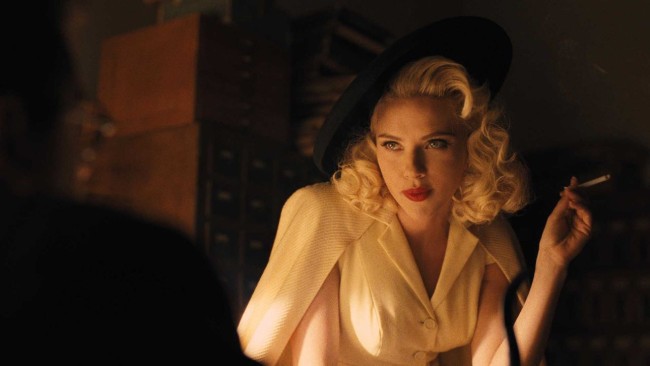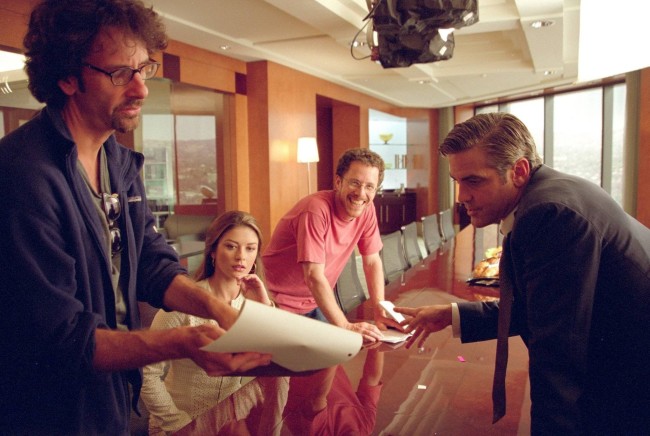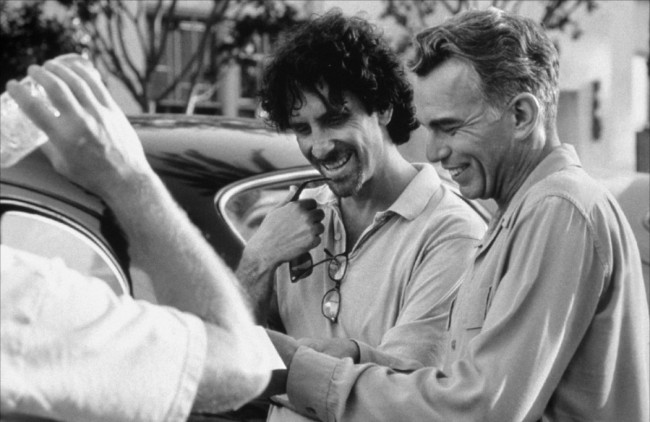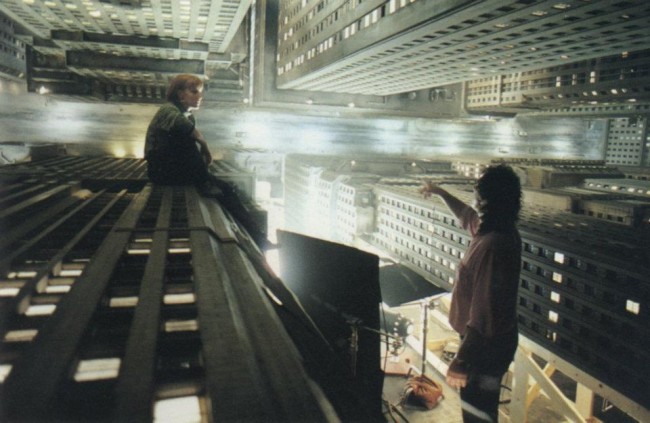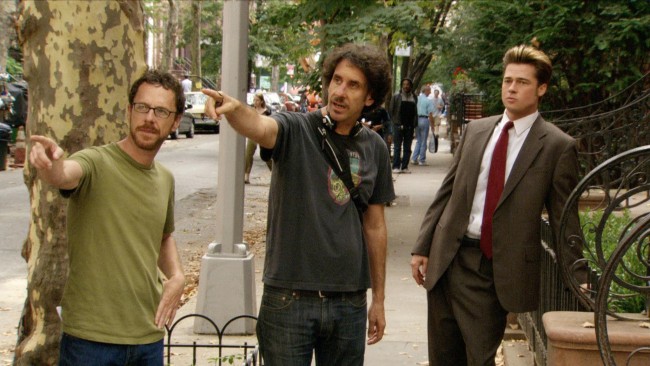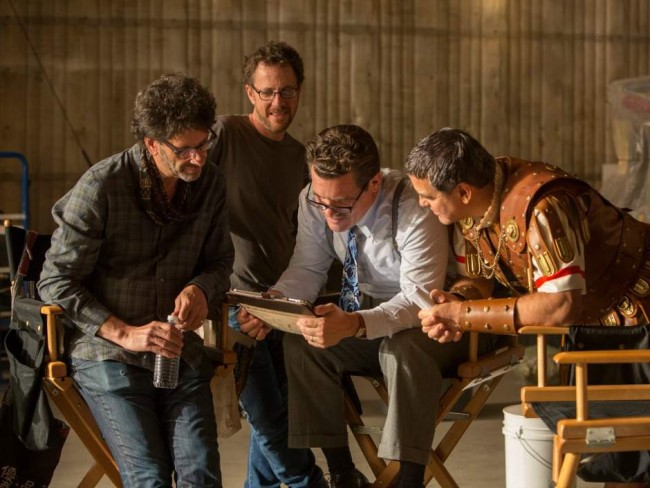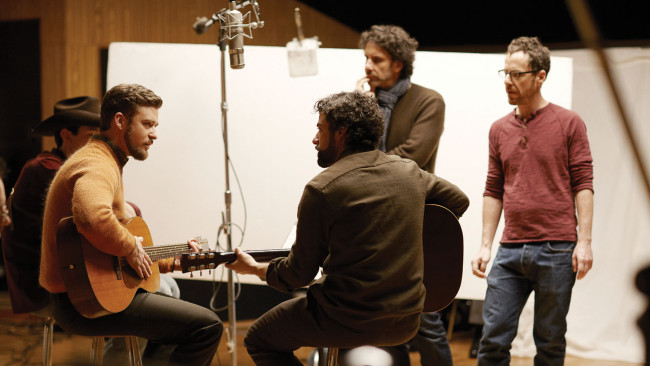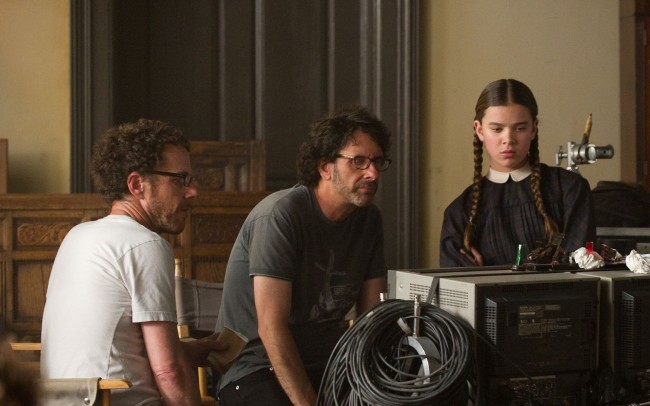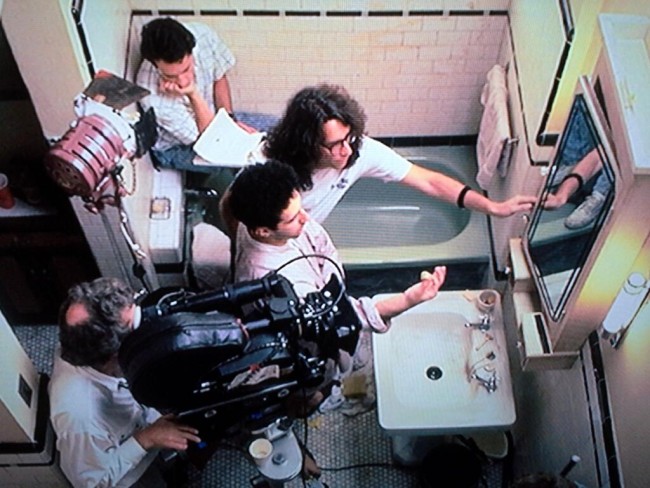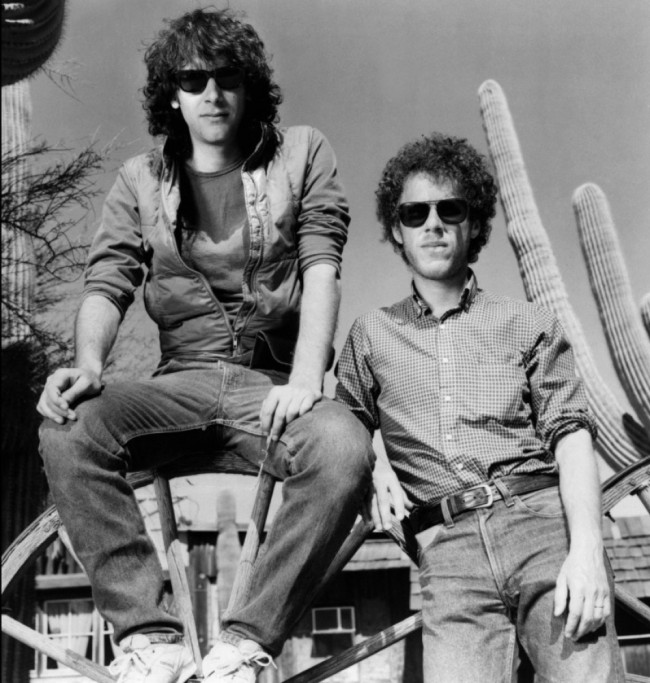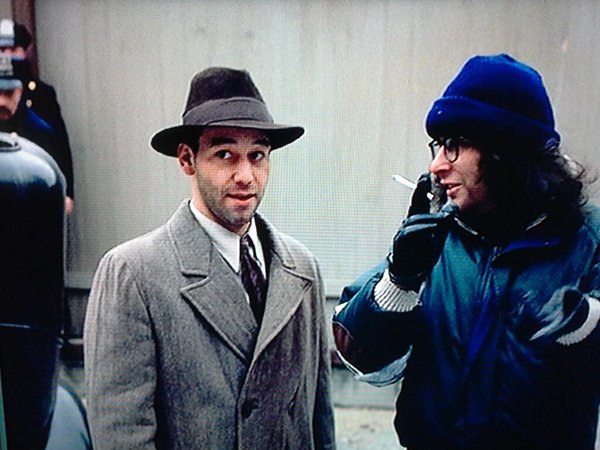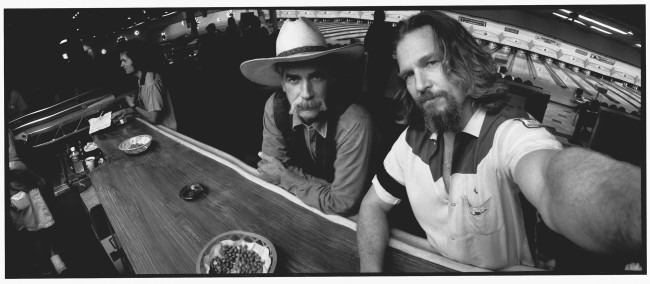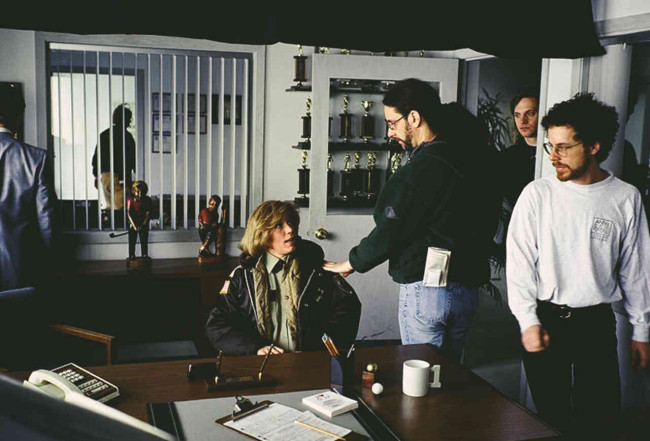By James Hancock January 19th, 2016 (updated February 4th, 2016)
If you’re a fan of the Coen Brothers you’re already looking forward to February 5th with the same excitement as I am. Hail Caesar! looks like it might be one of the most entertaining movies by the Coen Brothers in many years and I’m very fired up to see their take on the Golden Age of the Hollywood Studio system. We had a taste of what they are capable of on this front in Barton Fink back in 1991 but now with many decades of filmmaking under their belts, this is the perfect time for the Coen Brothers to offer their insiders’ perspective. I’ve loved the Coen Bros ever since I discovered Raising Arizona (1987) as a child and I’ve kept with them through their ups and downs over the last few decades. In my opinion, every Coen Bros movie is worth seeing but several of their films rank among the best films I have seen released in my lifetime. It is remarkable that these brothers have managed to create such a diverse body of work without ever feeling the need to go their separate ways. Many who have worked them comment on how they finish one another sentences and almost never disagree on creative decisions on set. There doesn’t seem to be any clear division of their duties either as they slip in and out of writing, directing and producing as the situation requires. My siblings and I could easily come to blows over deciding what music to listen to and I can’t even begin to imagine what it would be like to try and produce a film with them. Somehow Ethan and Coen are completely compatible creatively. I’m crossing my fingers that Joel and Ethan Coen are back in fine form with Hail Caesar!. This genre-bending filmmaking duo has explored such a wide range of material with varying degrees of success, that even their most ardent fans find it hard to agree on their essential films. So in the interest of getting a lively debate going in anticipation of their latest film, I thought it would be fun to look at the Coen Brothers’ filmography as a whole and rank them from my least favorite to the best. Enjoy.
19. The Ladykillers (2004)
While fans might disagree on which films are the best by Joel and Ethan Coen, The Ladykillers might be the most universally disliked movie they’ve ever made. While I’m not eager to watch this film on repeat, I think some of the criticisms have been a tad excessive. That said, I’m not leaping to defend this remake of Alexander Mackendrick’s 1955 film of the same name. I like to think of this comedy as a well-intentioned misfire with a great cast, but not much else to boast about.
18. Intolerable Cruelty (2003)
I remember being somewhat alarmed at the time when I heard that the Coen Brothers had accepted their first work-for-hire assignment rewriting and directing someone else’s concept, Intolerable Cruelty. The story follows what happens when the ultimate gold digger and a ruthless divorce lawyer fall in love and apparently was originally intended to reunite Julia Roberts and Richard Gere. For such wildly original filmmakers, this project seemed to me to be totally unnecessary and sadly the film is a pretty underwhelming experience. Catherine Zeta-Jones is astonishingly beautiful and for the most part the film is charming and funny, but in the final analysis Intolerable Cruelty can’t hold a candle to the Coen Brothers’ best work.
17. Tuileries (segment from Paris, je t’aime, 2006)
The anthology film Paris, je t’aime consisted of 18 short films by 22 filmmakers including Wes Craven, Gus Van Sant, Alfonso Cuarón, Alexander Payne and the Coen Brothers. I have never seen the film in its entirety but I managed to catch the entertaining segment called Tuileries by the Coen Brothers. Steve Buscemi stars as wide-eyed American tourist in Paris who finds himself in a bizarre situation in the subway involving violent young lovers, STDs and an evil child fond of shooting spitballs. While not their boldest effort, the short film is well worth hunting down.
16. The Man Who Wasn’t There (2001)
Joel Coen and David Lynch were both awarded Best Director at the 2001 Cannes Film Festival, but in my opinion Lynch’s film from that year Mulholland Drive has aged far better than The Man Who Wasn’t There. The latter film is an unusually subdued, neo-noir in black and white with a dash of UFOs. The film has strong performances across the board and gorgeous cinematography but the film is missing that magic, visceral ingredient that makes their earlier film noir Blood Simple such an essential classic. My theory is that it was a mistake having a quiet, emotionally withdrawn character as the protagonist of the story, however, I don’t want to overstate the case against this movie in that it has many admirers. I only saw this film once in the theater but I have a hard time getting excited to watch it again.
15. The Hudsucker Proxy (1994)
The Hudsucker Proxy was the first large scale production for the Coen Brothers and also their first legitimate flop. With a budget of approximately $30 million and enormous stars like Paul Newman, the Coen Brothers are the first to admit that they had difficulty making the comedy work while juggling the demands of building massive sets and having several units shooting simultaneously. That said, I have a lot of sentimental affection for The Hudsucker Proxy. While Jennifer Jason Leigh struggles with her very clear homage/impersonation of Rosalind Russell in His Girl Friday (1940), Tim Robbins is more than up to the challenge as the goofy, achingly sincere inventor of the hula hoop. This love song to the classic screwball comedies of the 30s/40s is admittedly a flawed film, however it turned out to be the stepping stone into one of the most exciting periods in the careers of the Coen Brothers.
14. Burn After Reading (2008)
After the success of the dark, utterly relentless No Country for Old Men (2007), the Coen Brothers returned to lighter fare with the underrated Burn After Reading, a comedy about what happens when a CIA operative’s memoirs fall into the wrong hands. The sad reality for the Coen Brothers is that every comedy they’ve made since the late Nineties inevitably invites negative comparisons to the cult classic The Big Lebowski (1998). I agree that Burn After Reading is not remotely the equal of The Big Lebowski, however the movie still made me howl with laughter repeatedly. The entire movie is worth watching just to hear Tilda Swinton’s delivery as she talks down to George Clooney, “Harry, stop the foolishness and behave. You’re not talking to one of your *shithole* buddies.” She is one of a kind.
13. A Serious Man (2009)
Perhaps the most personal film to date by the Coen Brothers, A Serious Man is an excellent dark comedy where we a watch a middle-aged man’s personal, spiritual and professional life completely fall apart in spite of his best efforts to hold everything together. Set in Minnesota in 1967, the film was loosely inspired by a mysterious rabbi the Coen Brothers knew as children and the majority of the story offers a fantastic look inside the environment in which the Coen Brothers grew up.
https://youtu.be/7iggyFPls4w
12. World Cinema (segment from To Each His Own Cinema, 2007)
World Cinema is a low-budget short film by the Coen Brothers and looks as if it did not take more than an afternoon to make from start to finish. In spite of the casual nature of this short, the film is absolutely hysterical. Commissioned in commemoration of the 60th Cannes Film Festival, To Each His Own Cinema features short films by 36 directors. I have not seen the entire film but luckily the contribution by the Coen Brothers is online for all of us to enjoy.
11. Hail, Caesar! (2016)
While not likely to go down in history as anyone’s favorite film by the Coen Bros, Hail, Caesar! is an absolutely hysterical look at 24 hours in the life of the head of physical production at a Hollywood studio in 1951. Josh Brolin plays Eddie Mannix, a Mr. Fixit, who seems to carry the weight of the entire studio’s well being on his shoulders as he deals with carnivorous gossip columnists, pregnant movie stars, communist subterfuge, and a spiritual crisis forcing him to second guess what he is doing with his life. What the movie lacks in focus it more than makes up for with a delirious love song to the westerns, musicals and biblical epics that Hollywood made so well at that point in its history. If you love movies, but more importantly, love the movie business, this is an essential movie in the filmography of the Coen Brothers.
10. Inside Llewyn Davis (2013)
We’re officially in my top 10 favorites by the Coen Brothers so I am pretty much going to do nothing but vomit praise on the movies from here on out. Oscar Isaac was already a veteran actor when he signed on as the lead for this film, but for me this is the first movie where we saw that Oscar Isaac was destined to become an A-list leading man and one of the best actors of his generation. If Oscar Isaac had not pursued acting, one can see that he could have easily been a star musician had he made the attempt. On a personal level, I was immediately hooked as soon as I saw the trailer to Inside Llewyn Davis. I live in Greenwich Village in downtown Manhattan and I was thrilled to see the Coen Brothers deliver such a stirring tribute to the music scene that thrived in this neighborhood only a few decades ago.
9. True Grit (2010)
Whenever people starting declaring the demise of the western, somebody comes along and gives us a formidable entry into what is easily one of my favorite genres of filmmaking. Contrary to what many think, this movie is not a remake of the classic starring John Wayne from 1969 but instead is a fresh adaptation of the novel by Charles Portis. Hailee Steinfeld and Jeff Bridges both deliver fine performances creating a heartfelt chemistry that might be the most tender relationship in the entire filmography of the Coen Brothers.
8. O Brother, Where Art Thou? (2000)
I was working on location in Las Vegas at the time of this film’s release and my hotel had a multiplex on the bottom floor that happened to be playing O Brother, Where Art Thou?. After a few days in Vegas, the casino’s atmosphere made me feel nauseous so I decided to kill my free time repeatedly going to see this amazing movie about three escape convicts on the run in Depression-era Mississippi. I ended up catching the film five times in the theater and had an absolute blast each and every time. The soundtrack assembled by T Bone Burnett is one of the greatest in movie history but it is the hysterical story, one loosely inspired by Homer’s The Odyssey, that always manages to keep me riveted.
7. Barton Fink (1991)
In a story that is now part of movie history, the Coen Brothers were suffering from writer’s block while working on the screenplay for Miller’s Crossing. As a way of dusting the storytelling cobwebs out of their heads, they took a three week break to write the script to Barton Fink. The result was a film that won the Palme d’Or as well as best director and best actor at the 1991 Cannes Film Festival, not bad for a quick exercise designed to get their creative juices flowing on a completely different film. I’m an absolute junkie for books and movies about film history, and what I love most about Barton Fink is its depiction of Hollywood in 1941. Tony Shalhoub deserves a lifetime achievement award for his astonishing performance as producer Ben Geisler who is assigned to help Barton Fink write a screenplay for a new wrestling picture. Easily one of their most unconventional movies, many Coen Brothers aficionados justifiably regard Barton Fink as their finest film.
6. Blood Simple (1984)
Rarely do filmmakers make their debut with a film as strong as the bloodcurdling neo-noir Blood Simple. Like many hardboiled crime stories, Blood Simple involves a jealous spouse trying to kill his wife and her lover but the execution of the story by the Coen Brothers is what elevates the film into a classic of the genre. Imitating the successful that their friend Sam Raimi used to raise money for The Evil Dead (1981), the Coen Brothers filmed a trailer for the movie starring themselves which they could then take to potential investors. They ended up raising $1.5 million for their first film and two extraordinary careers in filmmaking were officially underway.
https://youtu.be/4mC5CUTwjno
5. Raising Arizona (1987)
My introduction to the Coen Brothers, Raising Arizona is one of my favorite films of the 1980s. There are only a handful of great directors that I unknowingly discovered as a kid where my infatuation with their movies carried over into the hardcore cinephilia of my adulthood. This list includes John Carpenter, David Cronenberg, Quentin Tarantino and of course the Coen Brothers. Stylistically the film displays the confidence of veteran filmmakers in full command of the language of cinema but best of all is the truly bonkers comedic sensibility this movie embraces from start to finish. Nobody writes shitkicking hillbillies better than the Coen Brothers. Part of me wishes I could see this film now for the first time with fresh eyes. I watched it so many times on HBO as a kid that I can basically screen the movie in my head anytime I want.
4. Miller’s Crossing (1990)
I had to do some serious soul searching for how I rank these last few films by the Coen Brothers. I consider all of them to be some of my favorite movies I have ever seen. Miller’s Crossing is one of those movies where the dialogue and performances make my senses purr with pleasure. There are times where this movie, with its stunning music and cinematography, achieves a mythic grandeur rarely if ever seen in gangster films since the days of classics like Raoul Walsh’s The Roaring Twenties (1939). The scene where Gabriel Byrne marches John Turturro into the woods debating whether or not to kill him gives me goosebumps every time I watch it. In the decades since the Great Depression, there have been many movies that attempt to pay homage to the Prohibition era gangster movies of the 1930s, but for my money Miller’s Crossing is without question the best.
3. No Country for Old Men (2007)
No Country for Old Men is arguably the best comeback film in movie history. After the disappointments of Intolerable Cruelty and The Ladykillers, many wrongly were predicting the decline of the Coen Brothers. No Country for Old Men promptly ran over these critics like a runaway freight train. I’ve been a fan of Cormac McCarthy’s books for a long time and I watched in dismay when All the Pretty Horses (2000) completely failed to do justice to the source material. The novel No Country for Old Men is by no means regarded as one of McCarthy’s strongest, but the film is easily the one that captures best the style and mood the dark, apocalyptic western landscape as McCarthy imagines it. McCarthy’s world is one where seemingly supernatural creatures like Anton Chigurh, played to perfection by Javier Bardem, prowl the highways like angels of death to prey on decent people like those played by Josh Brolin and Kelly Macdonald. Rarely have a filmmaker and novelist’s contrasting sensibilities come together so harmoniously. Film fanatics often pine for the days of the bleak, deconstructionist classic of the early 1970s and in my opinion No Country for Old Men is a perfect throwback to that rich cinematic period.
2. The Big Lebowski (1998)
While I was in college, I witnessed a strange phenomenon where The Big Lebowski swiftly disappeared from movie theaters with most critics labeling the movie as a disappointing follow up to Fargo. I was a little bewildered by the reaction and returned to the theater several times to catch the flick while I still could. I felt then and still do that the film is the perfect parody of traditional film noir, one that showcases all the delightfully deranged personalties one can encounter in the City of the Angels. While it might have disappeared from theaters, when the movie was finally released on VHS and DVD, suddenly the film seemed to be everywhere. The Big Lebowski took over the campus as everyone I knew began hosting parties where the goal was to get as fucked up as humanly possible while watching the movie on a loop. In the span of a few weeks I watched as several friends faces ballooned into blubber from excessively pounding White Russians. It was one of those rare cult film experiences where everyone agreed that the movie improved with each viewing and I happily went along for the ride. Nearly twenty years later, the film seems more beloved than ever and I imagine that will always be the case.
1. Fargo (1996)
I don’t like to use the expression “perfect film” casually, if ever, but Fargo is a rare situation where I think the term applies. Every detail of this film just shines. The cast, one that includes Frances McDormand, William H. Macy and Steve Buscemi, has never been better. Carter Burwell’s operatic score soars at every opportunity. Roger Deakins’ cinematography is ecstasy for the eyeballs. But the greatest achievement of this movie is the screenplay by Joel and Ethan Coen, one that brilliantly provides the architecture for one of the best films of the 1990s. This is one of those movies where if I even catch a frame of it, there’s no choice but to hunker down and watch the entire thing. I have no clue if the Coen Brothers will ever match this movie again, but I sincerely hope they do. With Fargo, the Coen Brothers accomplished that rare feat of making a movie that will endure the test of time. The fact that one of the most popular shows on television today is based on this film already speaks volumes about the longterm influence of Joel and Ethan Coen. This is a special movie and one I feel no hesitation in labeling with the moniker, masterpiece.
* * *
I’ve had a blast revisiting some of the Coen Brothers’ movies while writing this post. Watching their classics is the best way to scratch the itch while I wait for the release of Hail, Caesar! The trailer below is only a small taste of the movie but I have a very strong feeling that this movie is going to be great. So let me know what you think of my list and don’t hesitate to give me a shout on Twitter to let me know the order in which you’d rank the movies by this remarkable filmmaking duo.
I am one of the Co-Hosts of Wrong Reel and you can find more of our content here:

